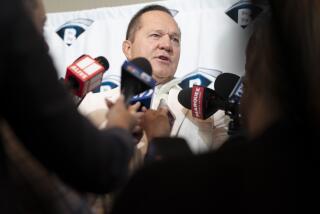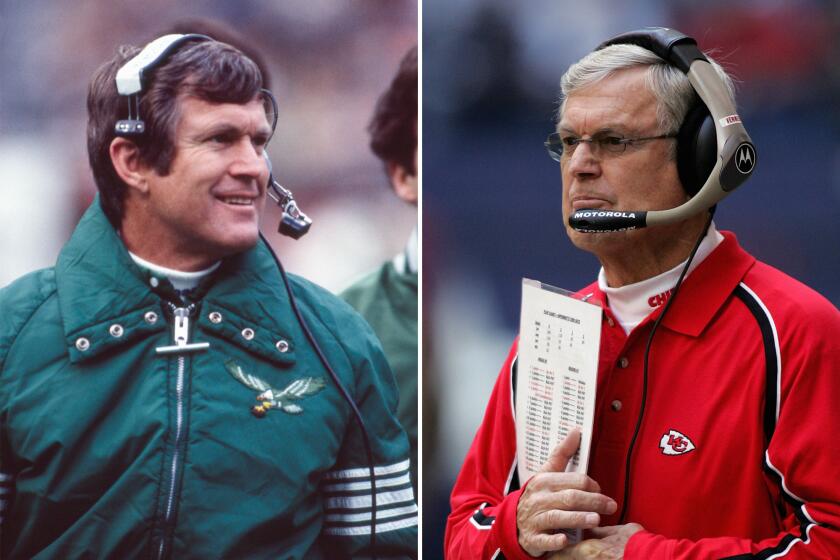Arbitration Could Be Going Out With Bang : Baseball: Twenty-nine players asking for $3 million or more. Owners hope process is in final year.
- Share via
In what major league owners hope will be the final year for the economically dreaded process of baseball arbitration, 100 eligible players exchanged salary figures with their respective clubs Tuesday.
Although another winter of wild spending has put many of the game’s leading players under contract, six more--Rafael Palmeiro, Mark Grace, Jeff Montgomery, Duane Ward, Tim Belcher and Jack McDowell--are pursuing salaries of $4 million or more in arbitration, and 23 others will be seeking $3 million or more, including former Angel pitcher Jim Abbott, who is bidding for $3.5 million from the New York Yankees in the aftermath of his 7-15 season.
The owners’ hatred of the arbitration process stems from such actions as the filing of Boston Red Sox first baseman Carlos Quintana, who made $340,000 last season and wants $850,000, even though he didn’t play a game in 1992 because of injuries suffered in a preseason car accident. The Red Sox filed at $340,000.
Richard Ravitch, president of the owners’ Player Relations Committee, said the average salary increase for the arbitration-eligible players will likely match or exceed the 88% increase in each of the last three years.
In his attempt to negotiate a partnership or revenue-sharing system with the players’ union during the reopened collective bargaining talks, Ravitch said he is “looking to eliminate arbitration in its current form.”
“If we can agree on the percentage of gross revenue that will be designated for salaries, I’m flexible on everything else,” Ravitch said. “I don’t have a rigid view on the question (of arbitration), but the current system is incompatible with the concept of (the clubs) knowing in advance what it will cost to play as measured by a percentage of the gross revenue designated for salaries.”
In other words, Ravitch said, a system that takes control away from the clubs, accelerating the salary escalation of young players at a time when the clubs are spending $220 million a year on player development, must be overhauled.
In the cases that have gone to arbitration hearings since the process began in 1974, the clubs hold a 187-154 advantage, but it’s always a pyrrhic victory because of the size of the raise that even a losing player receives. Only nine players have had their previous season’s salary reduced in arbitration. The 157 who filed last year received nearly $100 million in raises, an average of more than $600,000.
“There are other ways to go, fairer systems,” said Ravitch, who listed the following among his concerns with the current system:
--The arbitrator must choose either the figure submitted by the club or by the player with no room to compromise--higher, lower or in between.
--The club’s ability to pay or not pay isn’t permissible evidence.
--There are too many inconsistencies in how the arbitrator uses comparative statistics and salaries. For example: A fourth-year player seeking a one-year contract through arbitration can compare the salary he is seeking to a fourth-year player with a four-year contract that may be high on the scale of players in that service category because it is buying out that player’s first two years of free agency.
Ravitch also said the process often has a distasteful impact because of the antagonistic and negative nature of the hearing, and avoiding arbitration sometimes results in floodgates being opened.
The Toronto Blue Jays, for example, elected to sign catcher Pat Borders Tuesday. Borders, who earned $950,000 last season, agreed to a two-year contract for $5 million.
The Atlanta Braves, choosing to keep outfielder David Justice out of arbitration, gave him a raise from $555,000 to $1.775 million Tuesday. The Baltimore Orioles, wanting to avoid arbitration with outfielder Brady Anderson, gave Anderson a 408% raise to $1.855 million Monday. And the Detroit Tigers recently signed first baseman Cecil Fielder to a five-year, $36-million contract rather than going to arbitration, where Fielder would have broken Ruben Sierra’s 1992 award record of $5 million.
Ravitch acknowledged that he faces a difficult fight attempting to have the union forfeit a process that it received from management through collective bargaining.
“To say it will be difficult is an understatement,” Ravitch said. “On the other hand, the system has never been tested in a period of declining revenue. And that’s where we’re headed in ’94 (because of the possibility of a smaller national TV package and declining attendance). The players have to understand that the system won’t work amid declining revenue, and that they face as many problems as the owners.”
For the present, however, the problems are primarily those of the clubs. The players can not lose in arbitration. Tuesday’s filings by outfielder Luis Polonia of the Angels and four eligible Dodgers provide another example.
Polonia, who was paid $1.65 million while batting .286, with 51 stolen bases, last season, filed at $2.9 million, the highest ever by an Angel. The club countered at $2.05 million, the most the club has ever offered in arbitration, leaving almost a $900,000 avenue of compromise before a hearing that would be heard during the first three weeks of February.
Angel Vice President Dan O’Brien said he was a bit surprised by Polonia’s number “because we had already offered more than the midway point (between the two filing figures) and thought we had been fair with him.” O’Brien said they would continue to talk.
The Dodgers also have room for compromise, which has been the pattern under Fred Claire. Only two arbitration cases have gone to a hearing in his seven years as executive vice president.
“I’ve learned not to be surprised by the arbitration numbers,” Claire said of pitcher Jim Gott’s bid for a $775,000 raise to $2.8 million, pitcher Ramon Martinez’s bid for a $1.275-million raise to $2 million, infielder Jody Reed’s bid for a $1.3-million raise to $2.9 million, and infielder Mike Sharperson’s bid for a $963,000 raise to $1.55 million.
Sharperson played infrequently during the second half of last season; Reed batted .247; Gott was 3-3 with six saves, and Martinez was 8-11 with a 4.00 earned-run average and physical problems. “I don’t want to speak for his agent, but the key difference seems to be that they’re looking at Ramon’s career performance while the club is looking at the last year and a half when his numbers have not followed the same (progression) as they had been,” Claire said.
The largest filing Tuesday was by Palmeiro, the Texas Rangers’ first baseman, who is bidding for a $1-million increase to $4.85 million. The Rangers offered $4.25 million. The largest increase is being sought by San Diego Padre third baseman and triple-crown threat Gary Sheffield, seeking a $2.725-million raise to $3.45 million. The Padres countered at $2.76 million.
Abbott, who was offered $4 million a year for four years by the Angels, filed at $3.5 million, an increase of $1.650 million and $1.150 million more than New York’s figure.
Two successful but comparatively anonymous relief pitchers, Montgomery and Ward, are seeking raises in the $2-million neighborhood, to $4.3 million and $4.2 million, respectively, while former Dodger Belcher is bidding for a $1.9-million raise to $4 million after a 15-14 season that prompted the Reds to file at $3.3 million.
McDowell, 20-10 with the Chicago White Sox, is seeking a $2.4-million raise to $4 million after having received an 814% increase last year when he lost in arbitration.
More to Read
Go beyond the scoreboard
Get the latest on L.A.'s teams in the daily Sports Report newsletter.
You may occasionally receive promotional content from the Los Angeles Times.










